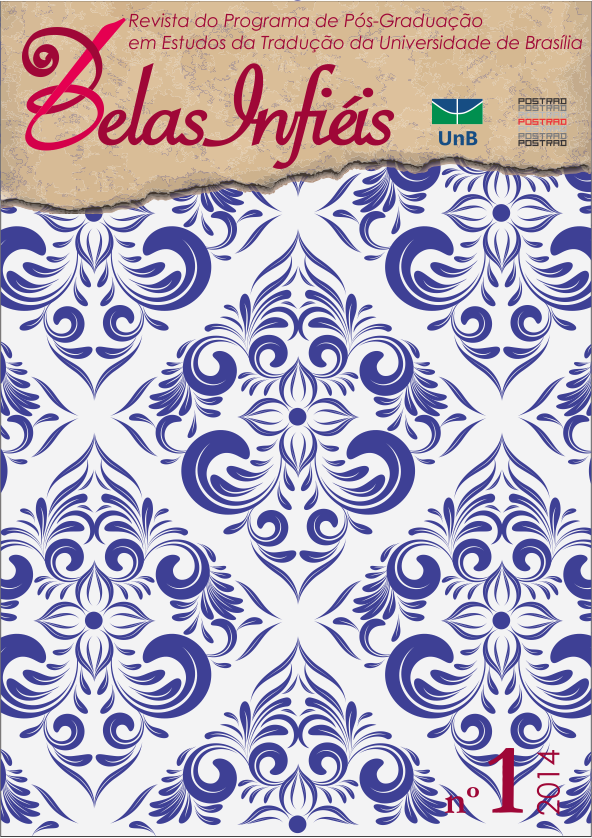REGARD SUR LES CRITIQUES DES TRADUCTIONS D’EN ATTENDANT LE VOTE DES BÊTES SAUVAGES ET D’ALLAH N’EST PAS OBLIGÉ D’AHMADOU KOUROUMA
DOI:
https://doi.org/10.26512/belasinfieis.v3.n1.2014.11258Palabras clave:
Ahmadou Kourouma, Critiques de traductions, Langues minoritairesResumen
Dans le présent article, l’auteure examine les critiques portées à la traduction des auteurs africains sub-sahariens, en particulier, Ahmadou Kourouma, écrivain emblématique, connu pour son style unique et son usage particulier des langues. L’analyse critique des traductions de ses deux romans révèle deux approches à la traduction des oeuvres littéraires des écrivains de l’Afrique sub-saharienne postcoloniale : l’approche de normalisation qui domine la traduction des oeuvres littéraires minoritaires vers les canons littéraires dominantes selon l’étude de Batchelor (2009), et l’approche de décolonisation des pratiques de traduction qui renforce les marques de visibilité des langues minoritaires. Nous soutenons l’idée que la critique de Schaefer sur les deux traductions anglaises d’En attendant le vote des bêtes sauvages de Kourouma (la traduction de Carrol Croates et celle de Frank Wynne) s’inscrit dans l’approche de décolonisation. De son côté, Stemeers présente des arguments en faveur des stratégies de normalisation employées par Frank Wynne dans la traduction anglaise d’Allah n’est pas obligé. Or, sur quelles bases théoriques fondent-elles leurs critiques ? Quels éléments des traductions forment l’objet de leurs critiques et quelles en sont les limites ? Ces quelques points constituent le point de départ pour notre réflexion.
Descargas
Citas
Batchelor, K. (2009). Decolonizing Translation: Francophone African Novels in English Translation. Manchester/Kinderhook:St. Jerome.
Bouygues, C. (1991). Plaidoyer pour la plus grande dispersion du texte africain ou apologie de la traduction. Canadian Journal of AfricanStudies/Revue Canadienne des Études Africaines, 25(3), 472-478.
Coates, C. F. (2000). AhmadouKourouma: A Biography. Callaloo,23(4), 1363-1366.
Gassama, M. (1995). La langue d’Ahmadou Kourouma ou le français sous le soleil d’Afrique.Paris:ACCT/KARTHALA.
Koné, A. (2007). Discourse in Kourouma’s Novels: Writing Two Languages to Translate Two Realities. Research in AfricanLiteratures, 38(2), 109-123.
Kourouma, A. (2010). Les Soleils des indépendances; Monnè, outrages et défis; En attendant le vote des bêtes sauvages; Allah n’est pas obligé; Quand on refuse on dit non; Le Diseur de vérité.(coll. Opus Édition du Seuil). Paris:Seuil.
Schaefer, J. (2004). En attendant le Vote des Bêtes Sauvages, by Ahmadou Kourouma: A comparaison of Two English Translations. Translation Review, 67(1), 58-71.http://dx.doi.org/10.1080/07374836.2004.10523856.
Stemeers, V. (2012). The Effect of Translating «Big Words»: Anglophone Translation and Reception of AhmadouKourouma’s Novel Allah n’est pas obligé. Research in African Literatures, 43(3), 36-53.
Vermeer,H. J. (2012). Skopos and Commission in Translational Action. DansL.Venuti (dir.),The Translation Studies Reader(3eéd.). New York/London: Routledge.
Descargas
Publicado
Cómo citar
Número
Sección
Licencia
Copyright Statement
Given the public access to this journal, the texts are free to use but requires the recognition of the original authorship and initial publication in this journal to be properly stated.
The journal allows the use of works published for non-commercial purposes, including the right to submit the work to publicly accessible databases. Published contributions are the sole and exclusive responsibility of the author(s).
- When submitting papers to be evaluated by the Belas Infiéis journal, the author(s):
- Declare that the contents of the contributions are original and of their original creation, being entirely responsible for their content if there is an objection by third parties.
- Claim to be aware that they should not commit academic plagiarism.
- Declare that the manuscript has not been published, completely or partially, in Portuguese or another language. If it is a translation it should be submitted to the Translated Articles section.
- Declare that the manuscript is not being evaluated by other journals.
- Declare that the manuscript was not submitted to another journal simultaneously.
- Commit(s) to inform the journal of any kind of error or inaccuracy in their contribution (published, in evaluation or in editing) and to collaborate with the editors to make due corrections of the article (when in evaluation or editing) or erratum/retraction (after publication).
- Declare that there is no conflict of interest regarding the published work.
- Authorize its release if it is accepted for publication without any kind of monetary compensation.
- Agree to assign non-exclusive rights to publication to the magazine, remaining free to make their contribution available in other media as long as the publication of the first version in Belas Infiéis magazine is mentioned. They also authorize Belas Infiéis to assign their texts for reproduction in content indexers, virtual libraries and similar platforms.
- Maintain copyright and grant the journal the right of first publication, the work being licensed under theCreative Commons Attribution License.
- Is/Are allowed and encouraged to publish and distribute their work online after the editorial process, which may increase the impact and citation of the published work.
- Authorize the editorial team to make textual adjustments and to adapt the article to the publication rules, when necessary.



















